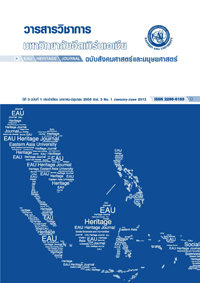รูปแบบการพัฒนาตามคุณลักษณะในวิชาชีพของนักศึกษาสถาบันอุดมศึกษาสาขาวิชาการจัดการโรงแรม
Keywords:
การจัดการโรงแรม, สถาบันอุดมศึกษา, สาขาวิชาการจัดการโรงแรม, professional characteristics, students in higher education institutions, school of hotel managementAbstract
งานวิจัยนี้มีวัตถุประสงค์เพื่อพัฒนารูปแบบการพัฒนาคุณลักษณะในวิชาชีพที่พึงประสงค์ของนักศึกษา สถาบันอุดมศึกษาประสิทธิภาพเกี่ยวกับคุณลักษณะในวิชาชีพของนักศึกษาสถาบันอุดมศึกษาสาขาวิชาการจัดการ โรงแรมตามรูปแบบการพัฒนาที่กำหนดขึ้น เพื่อใช้สอบถามนักศึกษาจำนวน 180 คน วิเคราะห์ข้อมูลด้วยวิธี การวิเคราะห์การถดถอยพหุ หลังจากนั้นนำผลมากำหนดขึ้นเป็นคู่มือการพัฒนาคุณลักษณะในวิชาชีพ ผลการวิจัย พบว่า (1) ปัจจัยด้านครอบครัว มีผลต่อความรู้และเจตคติของนักศึกษา (2) ปัจจัยด้านการศึกษาอบรมมีผลต่อเจตคติและ บุคลิกภาพของนักศึกษา (3) ปัจจัยด้านสภาวะแวดล้อมมีผลต่อ ความรู้ ความสามารถ เจตคติและบุคลิกภาพของ นักศึกษา และจากการประเมินประสิทธิภาพของคู่มือการที่กำหนดขึ้น โดยผู้ทรงคุณวุฒิห้าคนปรากฎว่า ความเหมาะสม ความเป็นไปได้ ความถูกต้อง และสามารถนำไปใช้ประโยชน์ได้จริง และเมื่อนำคู่มือดังกล่าวไปทดลองใช้ปรากฏว่า คะแนนก่อนกับหลังการทดลองแตกต่างกันโดยที่คะแนนทดสอบหลังสูงกว่า แสดงว่าคู่มือการพัฒนาคุณลักษณะ วิชาชีพที่ผู้วิจัยสร้างขึ้นมีประสิทธิภาพ
Developing Modelling for Professional Characteristics Pertaining to the Students in School of Hotel Management
The objective of this research was develop a model for the student’s professional quality. Additionally, it was to examine the efficacy related to hotel management students’ professional quality based on the established model of development, and hotel management academic learning at a university level, particularly the professional quality as specified in the Government Gazette, students majoring in for hotel management in higher educational institutions. A rubic scale questionnaire was used to collect data from 180 students. Multiple regresstion was used to analyze data. A professional quality manual was prepared and trebled for efficiency with F test. The outcome revealed that (1) the family factor has an effect on students’ knowledge and attitude; (2) the learning factor has an effect on the students’ attitude and personality; and (3) the environmental factor has an effect on the students’ knowledge, competence, attitude and personality. The assessment of the manual by five experts showed X = 8.93 points out of 10.00 for suitability, possibility, accuracy and applicability, which was higher than that of the set 7.30 points. The results of the experts’ assessment were concordant (W = 0.848 at α.01) and reliable (α = .0916) which were higher than the standard criteria for decision of 0.900. After the manual was put on a trial use, the points before and after the trial was significant by different where the latter points was higher (α.05) which means that the professional development manual was effici ent.




